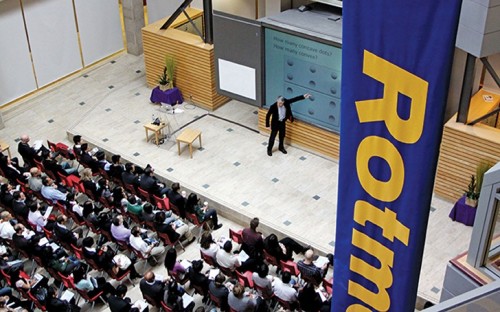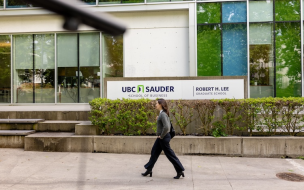But in April, Heather was busy solving boardroom problems for Kanetix, Canada’s leading insurance comparison website. She worked on marketing and strategy with the firm for about six weeks.
The company, launched back in 1999, specializes in online car insurance and is headquartered in Toronto, Ontario. Kanetix, which is partnered with more than 50 of Canada’s largest insurance providers, employs about 100 people. It was acquired by Monitor Clipper Partners, a US private equity firm, in 2011.
“It was a good opportunity to solidify my learning throughout the year in a real-life context, which made it that much more real,” said Heather, a first-year MBA student at Rotman School of Management.
She believes the experience has taken her MBA degree a step farther: “An MBA teaches you a lot, but unless you can apply it to the real world it doesn’t do you much good; you are supposed to go out of the MBA and into real-world problem solving.”
Rotman’s MBAs have taken to the new work experience course, which allows first-year students to test their new business knowledge in a corporate setting. Sitting in classrooms and revising theory is less interesting, and less effective.
“We wanted a course with more realistic problems… to give them live cases, which are more realistic and more likely to represent what they’re going to do [in jobs],” said Mara Lederman, an associate professor of strategic management at Rotman, who co-created the course.
The Capstone Project was launched in 2013. It is a mandatory program which all of the school’s 350 MBA students are required to complete. The project runs for six weeks. Students spend two weeks learning how to solve problems. Companies pitch to the class, who then bid for projects.
Mara said: “It helps teach them to solve problems, but at same time [with] guidance and learning. It transitions them from the standard MBA classroom to going off into work – a go between.”
This year, MBA students have worked with Labatt Breweries of Canada, Four Seasons Hotel, Kanetix and a non-profit organization.
The benefit to companies is clear. “A bunch of smart MBA students for free – and a new perspective,” said Mara. But it deepens the relationship between firms and the business school, which is part of the University of Toronto. “These [companies] like to hire our students. It gives them an opportunity to show the students about what it means to work there,” she added.
Heather said she found new confidence after completing the course this year. “I found it really helpful to use and apply the knowledge we were taught during the year. So, I feel more confident going into jobs,” said Heather, who spent a year at Beam, the world’s third largest premium spirits company, in 2012 before working at SickKids, a Canadian healthcare, teaching and research centre for children.
“I’m working in the summer so just knowing how to do an entire project means that I’m far more confident to do it in a real-world setting,” she said. That led her to Rotman and eventually to the school’s Impact Consulting Group, a student-run consulting firm which works with businesses in Toronto.
Heather added: “I’m hoping to go into management consulting, either external or internal.”
Mara believes Rotman can benefit from being more data-driven. Big data – a blanket term for the collection of large data sets – is a key theme for MBA students on the Capstone course.
“The school as a whole is pushing for students to be data literate… you cannot ignore big data. You can’t ignore the fact that companies have more data than ever [before],” she said. “Through the course we force them [to learn about data], regardless of which product they work on,” added Mara.
At the start of the year, students were given huge amounts of data. Heather had no idea what to do with it. “[But] we were able to look at it and know what was important,” she said.
As co-creator of the Capstone course, Mara is no stranger to the debate about developing closer ties with businesses. “It’s critical: there’s a disconnect between teaching them [MBAs] in a safe class environment, and throwing them into the real world,” she said. But the Capstone course mimics working life, and creates a bridge between business and business school.
“We take all those experiences that might happen in a job, that are challenging and scary. We’ll make you experience them and teach you how to cope with them – so you’re better prepared in your job,” added Mara. “It’s important to force them to have it, and teach them how to cope.”
RECAPTHA :
49
ba
3b
4b








